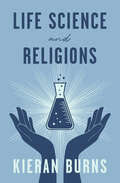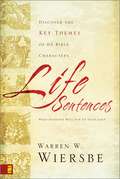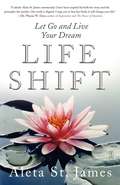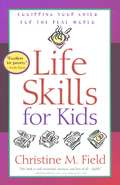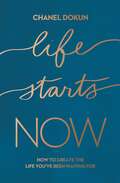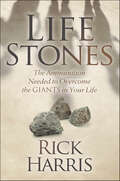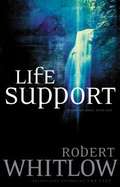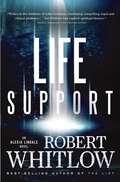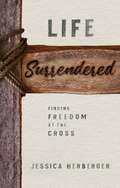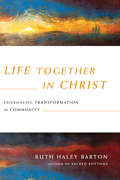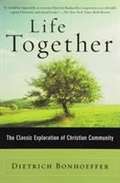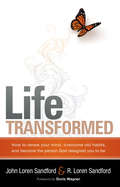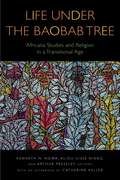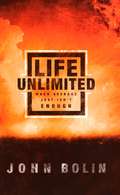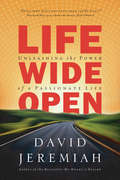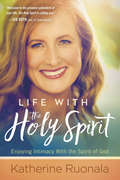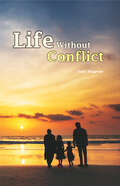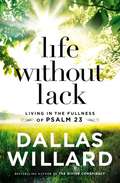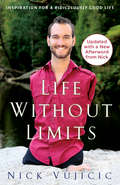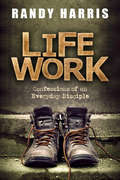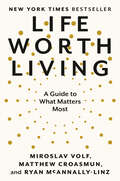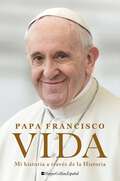- Table View
- List View
Life Science and Religions
by Kieran BurnsAn investigation of life science and world religions, and how the two intersect. In Life Science and Religions, Kieran Burns uses Christianity&’s story of the fall of Adam and Eve and the curse of painful childbirth as a starting point to explore the relationship between religion and life science. Over the course of this study, Burns covers Buddhism, Christianity, Confucianism, Hinduism, Islam, Judaism, and Taoism. He discusses topics such as evolution, human suffering, and the notions of healing and perfection. He even looks at what science has to say about spiritual apparitions like Our Lady of Zeitoun, Our Lady of Guadalupe, and Our Lady of Lourdes. This thought-provoking study is sure to interest both students and armchair scholars.
Life Sentences: Discover the Key Themes of 63 Bible Characters
by Warren WiersbeAn accessible reference book of brief practical chapters on sixty-three Bible characters, in chronological order, with each life summarized in one sentence from Scripture providing informative and devotional content. When we read about biblical personalities, we often discover mirrors in which we see ourselves. This book presents the biographical descriptions of sixty-three key Bible characters, from Old and New Testaments, and summarizes each one in one statement from the Bible. The book includes the author's ?life sentence? and a challenge to the reader to determine what his or her life sentence is. The purpose is to help the reader ?meet himself/herself in the Bible? and take steps to grow in grace and in the knowledge of Christ.
Life Shaping Decisions: A Career Planning Manual for Christian Young Adults
by Rick HornePlanning for a career is fraught with challenges and decisions to think through carefully. This workbook from ACSI is designed to help teenagers think through all the possibilities of their actions, including choosing a career, determining the will of God, and career stewardship.
Life Shift
by Aleta St. JamesFind your power, transform your obstacles, surrender to success Aleta St. James has spent the past twenty-five years as an emotional healer and life coach developing a system for creating deep and dramatic life changes with lasting results. In Life Shift, she shares the secret of how to bring enormous success and deep satisfaction into your life. In an effort to fully compete in a man's world, contemporary women have become alpha females. We rely on masculine traits -- the testosterone energies of action, focus, determination, and self-reliance -- to create success and achieve our goals. We are now coming to realize that while we have mastered these means for pursuing our dreams, we have neglected the equally valuable and complementary energies of magnetism, receptivity, and intuition -- the Magnetic Female. In Life Shift, Aleta presents her techniques for breaking through our emotional blocks and allowing our Magnetic Female and alpha energies to interact and harmonize with each other. She teaches skills that open the doors to a powerful cocreative relationship between these two forces within us and guides us to use these tools to identify our desires, engage our dreams, and realize our destinies. Using her renowned system, which integrates the teachings of primal therapy, Tibetan Buddhism, Hinduism, bioenergetics, and other life-enhancing practices and philosophies, Aleta shares with us all of the tools necessary to live our ideal lives. This Life-Shift Tool Kit incorporates techniques for realigning the physical, emotional, mental, and spiritual bodies, inviting rather than pursuing success, recognizing the power of release, eliminating emotional blocks, and reorganizing energy centers within the body. Aleta also offers her expert techniques in regenerative organic breathing, physical and emotional release work, color healing, light therapy, focused reflections, power mantras, prayers and blessings, love baths, and support circles. Weaving together Aleta's own dramatic story of inspiration, success stories from her elite clientele, and lessons from her journeys to spiritual "power spots," Life Shift teaches you how to transform feelings of failure, frustration, doubt, and loneliness into a creative power that becomes a magnetic force attracting joy, fulfillment, success, and love.
Life Skills for Kids: Equipping Your Child for the Real World
by Christine FieldDoes your child know how to use a check book? Boil an egg? Do the laundry? Read a map? Homeschooler Christine Field helps parents systematically teach kids - from preschool to the teen years - what they need to know to thrive as adults.From the Trade Paperback edition.
Life Starts Now: How to Create the Life You’ve Been Waiting For
by Chanel DokunCertified Life Planner and Relationship Expert Chanel Dokun shows women how to leave behind the stress and disappointment of a life spent chasing external significance and success and find profound joy and fulfillment in building a new one rooted in living out your unique purpose.Women are drowning in pursuit of the "good life." They chase external markers of success--building enviable careers, pursuing romantic relationships, and crafting the picture-perfect life--in attempts to soothe the aching suspicion that there must be more to life. But their efforts only leave them stressed, lonely, and tired of trying to answer the question: "Why isn't this enough?"Chanel Dokun spent the first half of her life focusing on achieving and attaining the lifestyle she thought she wanted. But she found herself feeling disappointed, disillusioned, and like she'd lost herself while running after a "successful" life. She realized that the world's definition of accomplishment was not a true measure of a life well lived, and she needed to redefine success and become the architect of her own life. Through practical strategies, anecdotes from her work coaching women around the country, and therapeutic examination, Chanel Dokun teaches women how to create the life they've been waiting for and sharesan in-depth look at why society's definition of significance isn't the answer in their search for more;the hidden reason why they are discontent;practical action steps to unlock their genius, find their flair, and discover their unique life purpose; andthe five postures of silence, solitude, generosity, gratitude, and play that can help them move from striving to thriving.Life Starts Now shows us that when we release the search for significance and recover a redemptive view of an ordinary life, we can experience profound joy and fulfillment--and embrace the wild wonder of the lives we've been given.
Life Stones: The Ammunition Needed to Overcome the Giants in Your Life
by Rick HarrisLife Stones deals with characteristics that, when absent or waning in a person’s life, cause giant obstacles in the personal life, relational life, and their life with God.When utilized, the “life stones” combat the natural tendencies to promote selfish tendencies and personal agendas which erode the eternal life that Christ provides that is centered on biblical principles. The goal of Life Stones is to draw people that are outside of the faith community of the church to the Lord Jesus and to edify the faith community itself to live a victorious and God-honoring life. Life Stones uses situations of both victory and defeat from Rick Harris’ forty-two years of pastoral and missionary experiences. With real-life situations, humor, and honesty Rick shows the contrast between a victorious Christian experience and a self-focused and self-absorbed existence. Life Stones addresses the defeats, frustrations, and fears that are common to all humankind…and the victory that is provided in utilizing “life stones.”
Life Support (Grace Medical #3)
by Candace CalvertNurse Lauren Barclay put her life on hold to keep a watchful eye on her troubled sister. It's why she's back in Houston. But that means confronting the brooding physician assistant who caused painful turmoil in her family--and left Lauren with memories her heart can't forget. Pa and single parent Elijah Landry is no stranger to stormy relationships, including one with his father, who is threatening him with a restraining order. It won't stop Eli from protecting his disabled brother--or from making peace with Lauren. He wants that and so much more. But as Lauren and Eli draw closer, a powerful hurricane roars toward Houston. Survival instincts take priority and everything changes. Can hope weather the storm? CANDACE CALVERT is a former ER nurse and author of the Mercy Hospital and Grace Medical series. Her medical dramas offer readers a chance to "scrub in" on the exciting world of emergency medicine. Wife, mother, and very proud grandmother, Candace makes her home in northern California. Please visit her website at www.candacecalvert.com.
Life Support (Santee Series, Book #1)
by Robert WhitlowAlexia Lindale knows her new case is a matter of life and death. She doesn't have a clue what it will do to her heart. . . and soul. From the Christy-award-winning author of The List, The Trial, and The Sacrifice comes this twisting tale of tough decisions, mixed motives, and mysterious, healing grace. Baxter Richardson survived a fall from a cliff while hiding in the mountains. Whether he'll make it through the next few weeks is unclear. His survival depends on the machines that help him breathe. On the haunted, unstable wife who wants to pull the plug and hide her secrets. On the doting father who wants him alive for reasons of love and money. On the conflicting legal documents that send the fight to court. And, on the music and prayers of an extraordinarily gifted pianist.
Life Support: Life Support And Life Everlasting (An Alexia Lindale Novel #1)
by Robert WhitlowAlexia Lindale knows her new case is a matter of life and death. She doesn't have a clue what it will do to her heart...and soul.From the Christy-award-winning author of The List, The Trial, and The Sacrifice comes this twisting tale of tough decisions, mixed motives, and mysterious, healing grace.Baxter Richardson survived a fall from a cliff while hiding in the mountains. Whether he'll make it through the next few weeks is unclear. His survival depends on the machines that help him breathe. On the haunted, unstable wife who wants to pull the plug and hide her secrets. On the doting father who wants him alive for reasons of love and money. On the conflicting legal documents that send the fight to court. And, on the music and prayers of an extraordinarily gifted pianist.
Life Surrendered: Finding Freedom at the Cross
by Jessica HerbergerJessica’s perfect life began to unravel, as she faced the twin pressures of raising her kids and watching her parents age. But along the way, she found new clarity on the freedom available to those willing to unclench their fists, lay down control, and truly die in a new way. Drawing inspiration from Jesus’s story from Garden to grave, Jessica’s message can help anyone struggling with maintaining control when life and family relationships are hard. Life Surrendered can help you live differently with more peace, less stress, and greater faith by looking as you look closely at the events of Good Friday.
Life Together in Christ: Experiencing Transformation in Community (The\transforming Resources Set Ser.)
by Ruth Haley Barton2014 Best Book of Spiritual Formation, from Byron Borger, Hearts and Minds BookstoreLife Together in Christ
Life Together: The Classic Exploration of Christian Community
by Dietrich BonhoefferIn Life Together, Dietrich Bonhoeffer, renowned Christian minister, professor, and author of The Cost of Discipleship recounts his unique fellowship in an underground seminary during the Nazi years in Germany. Giving practical advice on how life together in Christ can be sustained in families and groups, Life Together is bread for all who are hungry for the real life of Christian fellowship.
Life Transformed: How to Renew your Mind, Overcome Old Habits, and Become the Person God Designed You to Be
by John Loren Sandford R Loren SandfordBreak free from the thoughts that are holding you captive Have your thoughts become stumbling blocks to your progress? Do old feelings come back again and again to haunt you? To live the life God has for you, it is not enough to just address your habitual patterns of behavior. Your mind must learn to think in new ways. Routine tracks of thought must be overcome before the new way of God can be built. Life Transformed provides a practical approach to spiritual transformation, teaching you how to… Confront the issues of the mind head-on with biblical truth Overcome your destructive thoughts Take control of your life Become the person God wants you to be Life Transformed is about renewing your mind…like hitting the default button and taking you back to your origin in God before you were broken by sin. Its revolutionary approach will still the battleground where your thoughts and feelings rage.
Life Under the Baobab Tree: Africana Studies and Religion in a Transitional Age (Transdisciplinary Theological Colloquia)
by Kenneth N. Ngwa, Aliou Cissé Niang, and Arthur PressleyLife Under the Baobab Tree: Africana Studies and Religion in a Transitional Age is a compendium of innovating essays meticulously written by early and later diaspora people of African descent. Their speech arises from the depth of their experiences under the Baobab tree and offers to the world voices of resilience, newness/resurrection, hope, and life. Resolutely journeying on the trails of their ancestors, they speak about setbacks and forward-looking movements of liberation, social transformation, and community formation. The volume is a carefully woven conversation of intellectual substance and structure across time, space, and spirituality that is quintessentially “Africana” in its centering of methodological, theoretical, epistemological, and hermeneutical complexity that assumes nonlinear and dialogical approaches to developing liberating epistemologies in the face of imperialism, colonialism, racism, and religious intolerance.A critical part of this conversation is a reconceptualization and reconfiguration of the concept of religion in its colonial and imperial forms. Life Under the Baobab Tree examines how Africana peoples understand their corporate experiences of the divine not as “religion” apart from its intimate connections to social realities of communal health, economics, culture, politics, environment, violence, war, and dynamic community belonging. To that end Afro-Pessimistic formulations of life placed in dialogic relation Afro-Optimism. Both realities constitute life under the Baobab tree and represent the sturdiness and variation that anchors the deep ruptures that have affected Africana life and the creative responses. The metaphor and substance of the tree resists reductionist, essentialist, and assured conclusions about the nature of diasporic lived experiences, both within the continent of Africa and in the African Diaspora.
Life Unlimited: When Average Just Isn't Enough
by John BolinWhat's the secret to living a truly extraordinary life? John Bolin goes straight to the source for a Christ-inspired approach to personal growth and leadership development. Based on Luke 2:52, The Call to Greatness helps readers develop in the same ways that Jesus did: mentally, physically, spiritually and socially. Bolin has included a step-by-step program that allows readers to begin putting the principles into practice and achieve greater influence for God. A balanced and meaningful life is within reach!From the Trade Paperback edition.
Life Wide Open
by David JeremiahMost Christians sense that something vital is missing from their walk with the Lord. We are easily discouraged and bogged down in busyness, boredom, mediocrity, and routine. In this energizing new book, Dr. Jeremiah opens our eyes to how we can live a life that exudes an attitude of hope and enthusiasm . . . a life of passion . . . a life wide open!
Life With the Holy Spirit: Enjoying Intimacy With the Spirit of God
by Katherine RuonalaFellowship with the Holy Spirit, encounter God in deeply personal ways, and release the power of the Holy Spirit in signs, wonders, and miracles.Life With the Holy Spirit will bring you into the joy and power that comes from intimacy with Him through discussing topics such as: How to see the fruit of the Spirit manifest in your lifeHow to move in the gifts of the Holy SpiritThe power of praying in the Spirit and the gift of tonguesHow to hear and see in the Spirit (visions, dreams, and revelation)How to partner with the Holy Spirit for healing and miracles
Life Without Conflict
by Dada BhagwanAs much as we would prefer otherwise, conflict seems woven into the very fabric of life. On a daily basis, we find ourselves dealing with difficult people, facing unhealthy relationships, or suffering marriage problems. We might say that some of our relationships are the very definition of conflict! While asking ourselves how to adjust in these circumstances, and how to handle conflict, we remain confused and perplexed. In the book “Life Without Conflict”, Gnani Purush (embodiment of Self knowledge) Dada Bhagwan offers ultimate conflict resolution skills in the form of spiritual conflict resolution strategies. His spiritual teaching on how to resolve conflict - or to avoid it altogether - is offered in the context of common and everyday relationship challenges. Whether seeking relationship tips, marriage advice, or simply to learn how to stay healthy and to cultivate happy homes, this book will prove an invaluable resource.
Life Without Lack: Living In The Fullness Of Psalm 23
by Dallas WillardLearn the secret of living with contentment, peace, and security.Pause for a moment and ask yourself what your life would be like if it were completely without fear? If you did not fear death. If you did not fear life and what it might bring. If you did not fear any man, or woman, or any living creature. Would you live differently?In this unique work of never-before-published teaching, Dallas Willard revolutionizes our understanding of Psalm 23 by taking this comfortably familiar passage and revealing its extraordinary promises: “The Lord is my shepherd, I shall not want.... I will fear no evil.” The psalmist claims to live without any need and without any fear. How is that possible?Written with Willard’s characteristic gentle wisdom, Life Without Lack reveals the secret to enjoying God’s presence and becoming utterly caught up in his abundant generosity. The more we practice living in his presence, the more we experience the peace and freedom from worry that is promised in the psalm. Based on a series of talks by the late author and edited by his friend Larry Burtoft and by his daughter, Rebecca Willard Heatley, Life Without Lack will forever change the way you understand and apply the most well-known passage in all of Scripture.
Life Without Limits: Inspiration for a Ridiculously Good Life
by Nick VujicicLife Without Limits is an inspiring book by an extraordinary man. Born without arms or legs, Nick Vujicic overcame his disability to live not just independently but a rich, fulfilling life, becoming a model for anyone seeking true happiness. Now an internationally successful motivational speaker, his central message is that the most important goal for anyone is to find their life's purpose despite whatever difficulties or seemingly impossible odds stand in their way. Nick tells the story of his physical disabilities and the emotional battle he endured trying to deal with them as a child, a teen, and a young adult. "For the longest, loneliest time, I wondered if there was anyone on earth like me, and whether there was any purpose to my life other than pain and humiliation." He shares how his faith in God has been his central source of strength and explains that once he found his own sense of purpose--inspiring others to make their lives and the world better--he found the confidence to build a rewarding and productive life without limits. Nick offers practical advice for realizing a life of fulfillment and happiness by building trust in others, developing supportive relationships, and gaining strength for the journey. He encourages the reader by showing how he learned to accept what he could not control and focus instead on what he could. "I do believe my life has no limits! I want you to feel the same way about your life, no matter what your challenges may be. As we begin our journey together, please take a moment to think about any limitations you've placed on your life or that you've allowed others to place on it. Now think about what it would be like to be free of those limitations. What would your life be if anything were possible?"--Nick Vujicic, from Life Without LimitsFrom the Hardcover edition.
Life Work: Confessions of an Everyday Disciple
by Randy HarrisWhat does minimal human ethics look like? Can Christians really be followers of Jesus in the way they live today? In his own unique style, Randy Harris wrestles with these and other ethical issues facing Christians and all humanity.In a world gone crazy, what would basic human decency look like? Are there principles that all humans could follow to make their neighborhoods, countries, and world more just and peaceful? Randy Harris, from his long experience as a teacher of philosophy and ethics, calls us to those principles of fair play, justice, and peace.But Christians are called to an even higher standard. As a follower of Jesus, Randy, sometimes humorously, always pointedly, focuses on the call of Jesus for a higher righteousness. He places Christian behavior in the context of the philosophical and cultural contexts of our day, making profound concepts accessible to all his readers.This book offers down-to-earth wisdom from a lifetime follower of Jesus. Out of his own practice of the spiritual disciplines, his presentations before hundreds of churches and university audiences, and his deep love for his students, Randy draws us into the circle of love for God and for our neighbors.
Life Worth Living: A Guide to What Matters Most
by Miroslav Volf Matthew Croasmun Ryan McAnnally-LinzINSTANT NEW YORK TIMES BESTSELLER"Life Worth Living is transcendent. A collection of wisdom punctuated by questions of great consequence, this is the only book you need to find your way from where you are to where you are called to be." --Kelly Corrigan, NYT bestselling author, host of Kelly Corrigan Wonders and PBS&’s Tell Me MoreBased on the Yale class, a guide to defining and then creating a flourishing life, and answering one of life&’s most pressing questions: how are we to live?What makes a good life? The question is inherent to the human condition, asked by people across generations, professions, and social classes, and addressed by all schools of philosophy and religions. This search for meaning, as Yale faculty Miroslav Volf, Matthew Croasmun, and Ryan McAnnally-Linz argue, is at the crux of a crisis that is facing Western culture, a crisis that, they propose, can be ameliorated by searching, in one&’s own life, for the underlying truth. In A Life Worth Living, named after its authors&’ highly sought-after undergraduate course, Volf, Croasmun, and McAnnally-Linz chart out this question, providing readers with jumping-off points, road maps, and habits of reflection for figuring out where their lives hold meaning and where things need to change.Drawing from the major world religions and from impressively truthful and courageous secular figures, A Life Worth Living is a guide to life&’s most pressing question, the one asked of all of us: How are we to live?
Life \ Vida (Spanish edition): Mi historia a través de la historia
by Pope FrancisPor primera vez, el papa Francisco cuenta la historia de su vida, revisitada a través de los acontecimientos que han marcado a la humanidad en los últimos ochenta años, desde el estallido de la Segunda Guerra Mundial en 1939, cuando el futuro era un niño, hasta nuestros días. Vida es un viaje extraordinario por la historia del mundo a través de la mirada de un hombre excepcional. Con observaciones agudas y reflexiones profundas, el papa Francisco nos transporta a los sucesos más significativos de los últimos tiempos, desde el Holocausto hasta la caída del Muro de Berlín, pasando por el golpe de Videla en la Argentina y el Mundial de 1968, cuando Maradona marcó el famoso gol de la «mano de Dios». Desde su mirada única, el pontífice comparte en estas páginas sus recuerdos y reflexiones del Holocausto, las bombas atómicas de Hiroshima y Nagasaki, el ataque a las Torres Gemelas en 2001, la recesión económica de 2008, la pandemia, la renuncia de Benedicto XVI y el cónclave que lo eligió. El «papa callejero» abre su baúl de los recuerdos y, con la franqueza que lo caracteriza, nos transmite mensajes importantes sobre las principales crisis que nos confrontan hoy en día, entre otras, la desigualdad social, la crisis climática, la guerra, la carrera armamentística, la discriminación y las luchas en favor de la vida. «No hay que olvidar la lección más importante: podemos releer la historia de nuestra vida para hacer memoria y poder transmitir algo a quien nos escucha. Pero, para aprender a vivir, todos tenemos que aprender a amar». —Papa Francisco----For the first time, Pope Francis tells the story of his life as he looks back on the momentous world events that have changed history—from his earliest years during the outbreak of World War II in 1939 to the turmoil of today. An extraordinary personal and historical journey, Life is the story of a man and a world in dramatic change. Pope Francis recalls his life through memories and observations of the most significant occurrences of the past eight decades, from the Holocaust to the fall of the Berlin Wall, Videla’s coup in Argentina to the moon landing in 1969, and even the 1986 World Cup in which Maradona scored the unforgettable “hand of God” goal.Here are the frank assessments and intimate insights of a pastor reflecting on the Nazi extermination of the Jews, the atomic bombings of Hiroshima and Nagasaki, the 2001 terrorist attack on America and the collapse of the Twin Towers, the great economic recession of 2008, the Covid-19 pandemic, the retirement of Pope Benedict XVI, and the subsequent conclave that elected him Pontiff. The “pope callejero” recounts these world-changing moments with the candor and compassion that distinguishes him, and offers important messages on major crises confronting us now, including social inequalities, climate change, international war, atomic weapons, racial discrimination, and the battles over social and cultural issues.
